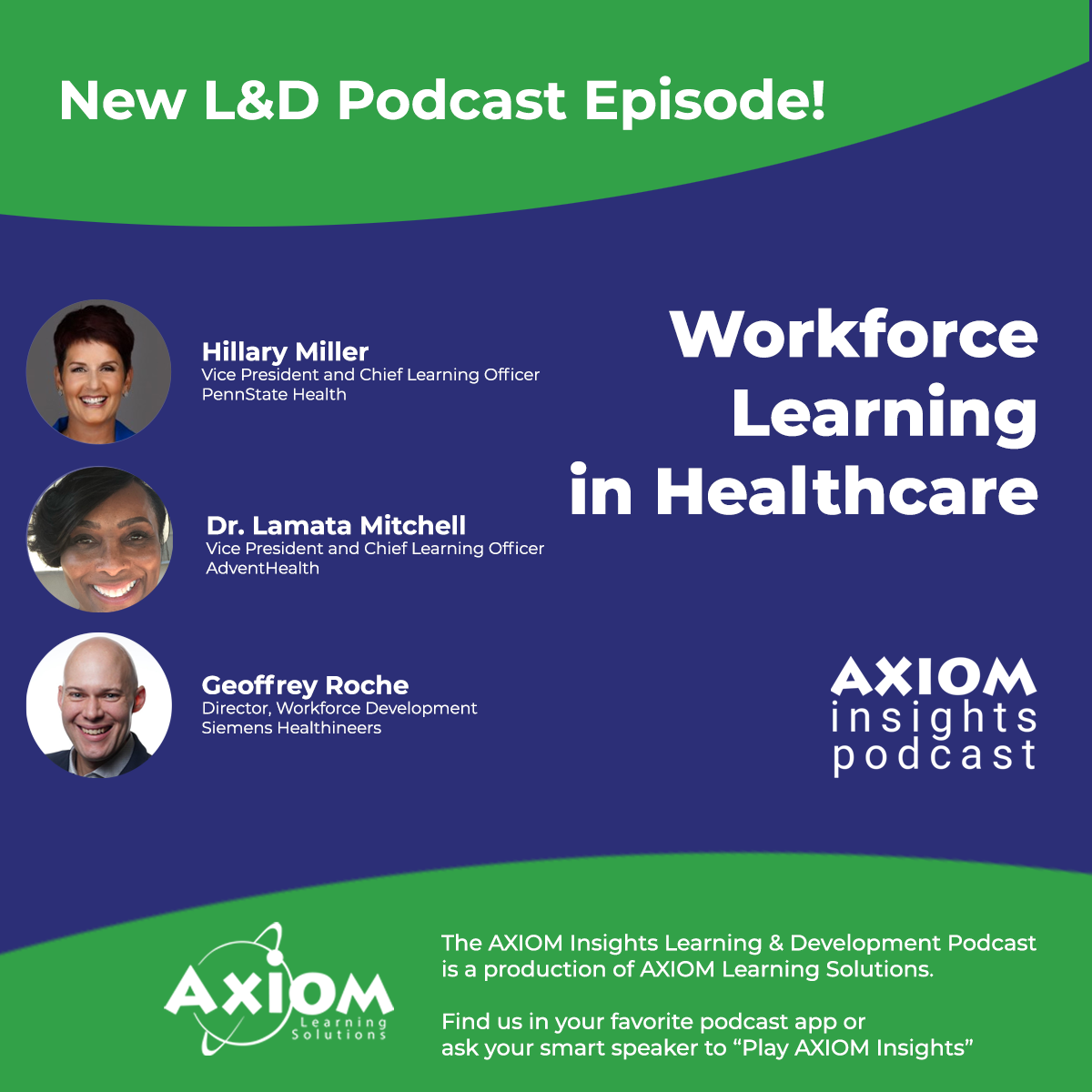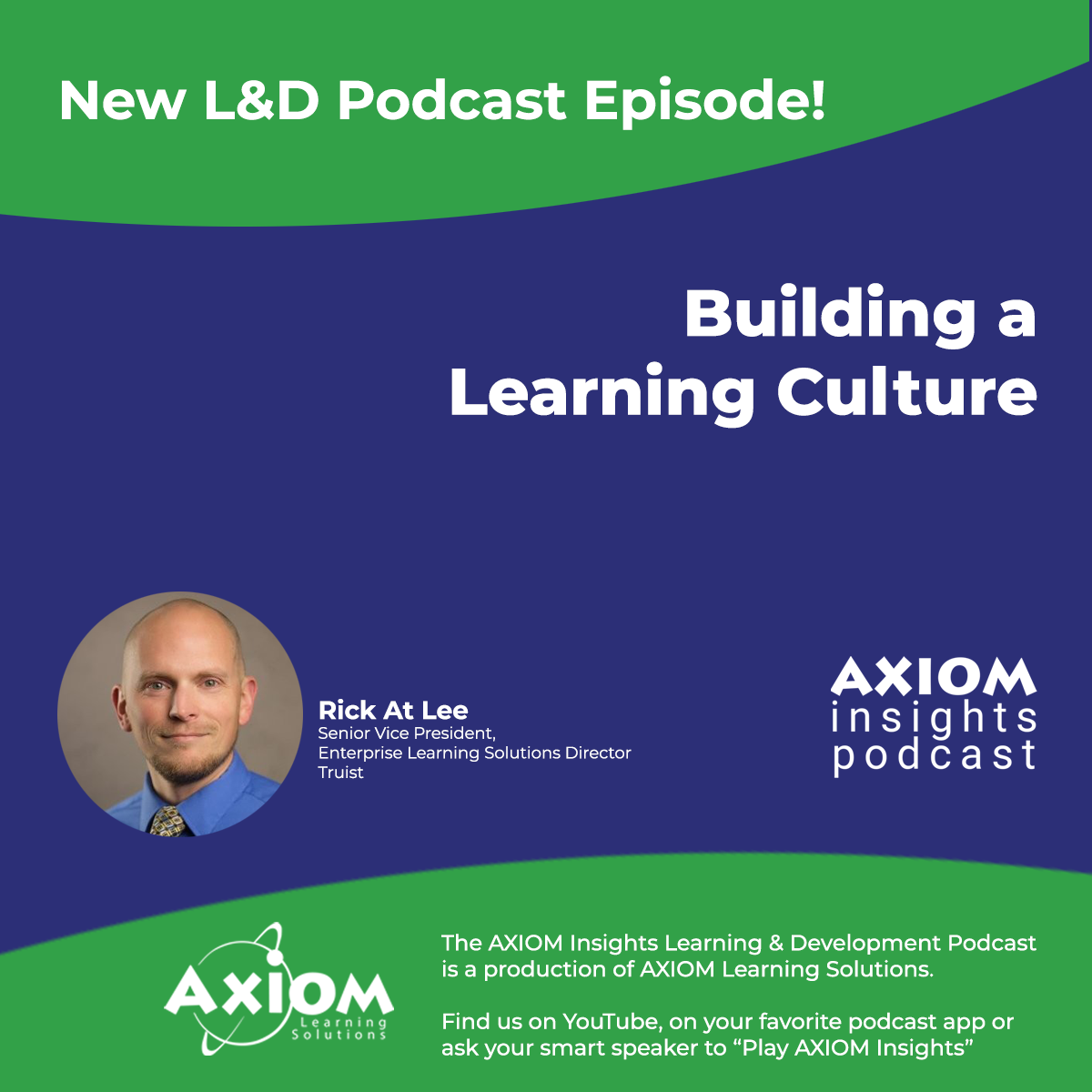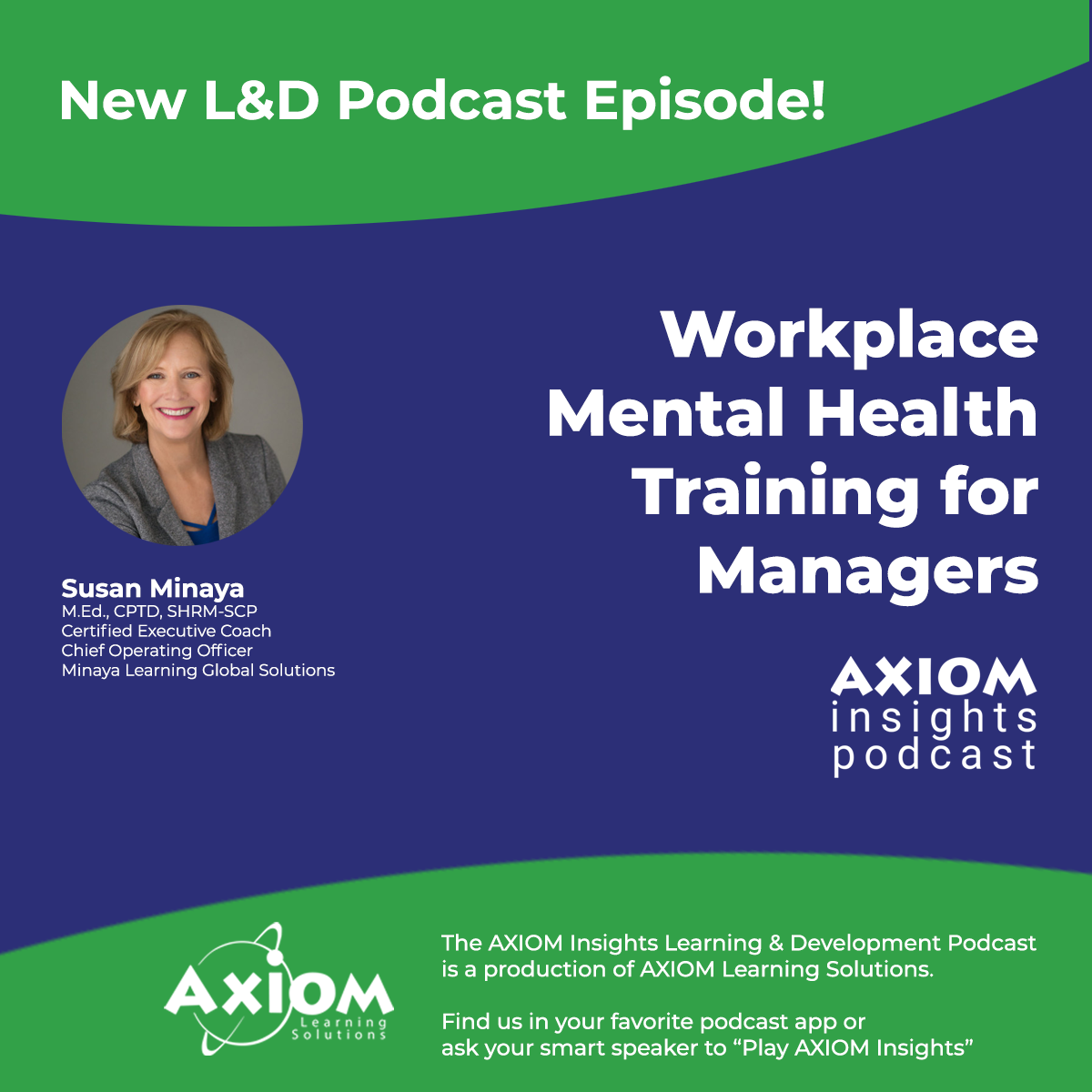Episode Transcript
Scott Rutherford
Hello and welcome to the AXIOM Insights Learning and Development podcast. I'm Scott Rutherford. In this podcast, we focus on driving performance through learning, and our conversation today is with an industry professional who brings a wealth of experience to the table. Charlene Zeiberg is Chief Learning Consultant with Zeiberg Consulting. Charlene, welcome to the podcast.
Charlene Zeiberg
Thank you so much for having me, Scott.
Scott Rutherford
Now today we're going to be talking about the work that you're doing as a fractional talent development partner. But I was hoping we could start before even we get into what that is and how that works. With just a sense of your background in learning and development, what have you done over time?
Charlene Zeiberg
Sure. Well, I started my L&D career in college, which I guess is not all that typical. I have a bachelor's in instructional design from Ithaca College and a M.Ed. in human resource education from Boston University. And my first role was as a technical trainer at Fidelity Investments. And my career continued as a change management consultant for Accenture, training manager for Broad Inc./Sun America, a senior learning consultant for the Forum Corporation, which is now known as Korn Ferry, and my last role was a director of learning solutions for PaineWebber, now UBS.
I was also an adjunct professor at UCLA and New York Institute of Technology.
I started my Zeiberg Consulting organization 25 years ago, and in that time I've worked with over 30 clients, and I'm proud to say that they're all referrals and longstanding relationships across multiple industries. And we set out to design engaging and result focused learning solutions in management and leadership development, professional skills, onboarding, sales effectiveness, cultural initiatives, as well as diversity, equity and inclusion. We also have a full off the shelf, license free curriculum. And in addition to our project based work during this time, I personally had six retainer relationships lasting between four and eight years each.
Scott Rutherford
Wow. So there's some deep experience in a variety of facets of learning and development over the years. Appreciate the context. So with all of that, sort of, sort of arming you, I guess, for being a fractional talent development partner, what does that mean?
How do you describe that and how is it different or similar to the work you've been doing since over the years?
Charlene Zeiberg
It's actually very similar. As I just mentioned, I've had these six retainer relationships, and that was the language that was used at the time was a retainer, but where the industry has really moved. And when I say the industry, I mean the marketplace, not just learning and development, is towards the language of fractional. So fractional partnerships provide in depth experience, knowledge and skills to expand the capabilities and accomplishments, in this case of an L and D or a talent development team.
So these relationships are not necessarily project based, they're part time. They contribute a fixed number of hours or days to an organization, and we work in partnership on a variety of projects to augment the talent on their own teams. So we supplement an L and D's internal team with external talent to accelerate the work effort and to meet the demands of the business.
So the biggest compliment that we have always received from each one of our relationships, which just has been great, is that I thought, you have worked for my company for years. So many times when working with people across the organization, honestly, they think myself or my colleagues are employees and have been with the firm for a while.
Some examples of the types of projects we worked on during these type of retainer or fractional type of relationships included acting as the learning architect for a high potential leadership development program.
And I did that for seven years for one of my retainer fractional relationships. Designing and developing a learning intervention to increase collaboration and encourage productive conflict. Designing and developing a program for managers aimed at increasing performance through these performance and career based conversations, we created a manager workshop to aim at retention, increasing retention and engagement to enable employees to flourish and thrive in their roles. We developed a series of video based learning assets to assets to answer frequently asked questions during COVID and we also designed an estate planning school for financial advisors. So we've also done work on more of that technical side for some wealth management organizations. But that gives you a flavor of the types of projects within a fractional or retainer relationship that we have worked on.
Scott Rutherford
So can you explain the types of projects and the types of work that the fractional arrangements that you've been involved with can take on, or what they could encompass? What they could take on?
Charlene Zeiberg
Sure. So we are strategic and pragmatic, trusted partners. So we could work in conjunction with a chief learning officer, a chief people officer, a chief talent officer or another senior member of the team. And we become a primary resource skilled in a broad range of talent development areas. So we do needs analysis, curriculum audits, learning strategy, competency development, high potential development. We develop micro learning, video scripts, learning content curation. I think you get it. There's really a broad range of things that we can add, you know, where we can add value. And each of the consultants on my team also bring their own unique talents. So we have team members that do video production, leadership coaching, as well as workshop facilitation.
And to boot, we also have extensive content experience in management and leadership development, professional skills, selling skills, diversity, equity and inclusion. And, you know, we also have this extensive off the shelf, license free curriculum, so it allows us to tap into that content and leverage it for our clients. And as an extended member of the team, we also have interviewed potential hires for their team, so assisted in that interviewing process, explored and recommended emerging technology tools that the team could use. We've assumed responsibilities for team members that have been on maternity leave, and we've also reviewed the work of team members and provided coaching so that we're also helping to develop the talent on their team and give them, you know, more experience through our feedback and coaching.
Scott Rutherford
So I want to look at the fractional relationship from the company's perspective just to understand sort of what the benefits are to the organization.
I could imagine it could be flexibility, it could be cost savings or, I don't want to speak for you, but what are the. Is there, are there certain factors that make a fractional arrangement a better fit for an organization?
Charlene Zeiberg
So many companies utilize dozens of vendors and consultants to meet their L-and-D needs, and this can get really costly and result in solutions that are like maybe misaligned to their specific needs and they require managing more consultants and vendors that maybe are not needed.
So, you know, when considering whether or not you're going to have this type of arrangement, you need to think about what's in it for the organization and whether or not that even makes sense. So do you need to add depth of experience without adding headcounts and benefit cost? Do you need to increase the capacity and speed to serve internal clients?
Do you want to have somebody on your team, an extra set of hands that can intimately know your organization to design custom learning, do you want to reduce cost from using licensed content?
Do you want to have this trusted advisor and expert on your team to mentor your team members? Do you want to consolidate and reduce multiple vendors?
And, you know, this is a really important one. Do you want to accelerate the pace of learning? There are so many demands on learning and development organizations right now that they can't necessarily keep up with all the needs, especially from all the different businesses, when there's a need that maybe is not for the entire enterprise, but is for a specific business. But you want to help, but you really don't have the bandwidth to be able to, you know, offer the assistance of your team.
So, you know, with this type of arrangement, we get to also stick around and live with the solutions that we provide, make improvements along the way so that we make sure that we're achieving the optimal success that we're ahead setting out to do. So, you know, this helps an organization to be more flexible, responds to changing needs and circumstances.
And this is, I would say it's a good type of arrangement for any size organization. My relationships that I mentioned earlier were for the most part with very large organizations. So, you know, that doesn't mean that only a large organization would be a Ben would be an ideal, ideal fit for a fractional relationship. But also companies smaller to medium sized companies, and those startups really rely heavy heavily on innovation. And these fractional partnerships really could be a game changer. Having access to deep rooted talent development expertise on a fractional basis allows companies to navigate new strategies to grow and develop new skills of their employees by integrating a fractional hire. And when I say a hire, I don't mean an employee hire, but more of a consultant, part time basis, extension of your team type of hire.
Scott Rutherford
Right. And that's one of the key differences. Right. Because you're bringing in someone who it would be, if you wanted to extend it to a full time hire, would be at the upper end of the compensation range, has a certain set of expertise and experience, so you're really able to access those skills at, you know, let's, I don't want to use the term discount, but at a discounted rate, you're paying less for the skills.
Charlene Zeiberg
Yes, usually there is a discounted rate because it's in exchange for a guaranteed number of days per year. So we do discount the rate down based on that, which, and again, with the consolidation, maybe of working with one vendor for this or one consultant with this, or the even savings, the time savings of being able to roll out an initiative even quicker really becomes a cost savings.
Scott Rutherford
So I wanted to ask you, because obviously your organization and mine, we both work with learning projects, and I wanted to get your perspective on having worked as a fractional talent development partner sort of embedded in a company. How does that function differently than a project that's just outsourced to a vendor?
Charlene Zeiberg
Well, it's actually, it's pretty different. In past fractional relationships, I am the extension of the team. I am not the team. I am an asset on the team. I'm an additional talent on the team. I'm an extension, another set of hands with outsourced relationships, which I was involved with when I worked for the forum corporation. Again, now, Coryde, they were in that outsourcing. They actually called it insourcing business. The organization assumes many functions of the L and D organization. If not all. So the difference really here is that I am part of the team and I'm really following along what the strategy is. I am informing the strategy, but I don't necessarily own the strategy. I don't own all the L and D work. It's not being completely outsourced. I'm there to make a contribution of expertise.
Scott Rutherford
So I have to ask you, what types of companies do you think would not be a good fit for this type of fractional relationship?
Charlene Zeiberg
So if you expect your fractional partner to always be available, that may not be the right fit for you. Fractional partners may have multiple clients or projects, so they may not be as flexible in the ebbs and flows of your business, should you want them to work additional hours as needed. I haven't personally come across that as a problem. I've been able to be very responsive to my clients needs. But, you know, it is a possibility that your fractional expert may be off working with another client and may not be there to drop everything as an employee would be able to do.
So that's one thing to consider. Also, if you don't have the bandwidth. So if the fractional relationship is going to report to you or a member of your team, and they don't have the bandwidth to get your fractional partner up to speed, that could be an issue as well. You need to take extra care in training for the institutional knowledge, the internal processes and the systems, the cultural norms, so that the fractional partner can build camaraderie and relationships with the other members of the team, so that they can have effective collaboration and also for team cohesion.
And then I would say that the last one is, maybe you don't have the budget to supplement your team.
So, you know, your organization may just look at this as an extra cost and not weigh it against the extensive benefits that it does offer, including productivity, efficiency, and that added expertise.
A fractional partner definitely is an investment, and it requires a commitment to that partner for a specific amount of time. And the last thing I just want to add here is there are. I've looked at so many positions online on LinkedIn and specifically, and indeed, and job descriptions, and when I look at them, the majority of them actually could be performed by a fractional resource.
And it's really up to the organization about whether or not that would be the right type of fit. But there are definitely places where I have served as a. In a retainer type of relationship, or a fractional relationship where they chose to work with me, as opposed to hiring an additional headcount for the team. It's usually a different line item on the budget, but also it just gave them lots of flexibility. They didn't necessarily need a full time resource or they couldn't find all the experience rolled up into one person, and maybe they just don't need the number of hours that a full time employee would provide. So, you know, those are really the things that you need to keep in mind to see whether or not this type of arrangement would be the right fit for your organization.
Scott Rutherford
And I would imagine that someone with your experience could actually be a consultant to help a company make that determination if they have a full time need that they're having trouble perhaps filling to see how that could be translated into a fractional role.
Charlene Zeiberg
Yes. I mean, there have been times where I have explored a fractional arrangement only to find that there really wasn't the depth of projects that were really needed to be able to keep my services going, for example, for a year. And so we decided to move to a project basis and work that way. And that's also a great way. To start with a fractional is to build that relationship, is to start with a project or two, see the value that can be added to your efforts, your stakeholders, as well as your team, and then decide whether or not there are additional initiatives that that fractional would really add a lot of value to.
Scott Rutherford
Right. Charlene Zeiberg is Chief Learning Consultant with Zeiberg Consulting. Charlene, thanks for coming on the podcast. I appreciate your perspective. I'll put a link to your website in the episode notes for this episode on axiomlearningsolutions.com/podcast. Charlene Zeiberg, thanks for being here.
Charlene Zeiberg
Thank you so much for having me. Scott.
Scott Rutherford
This has been the AXIOM Insights Learning and development podcast. This podcast is a production of AXIOM Learning Solutions. AXIOM is a learning and development services firm with a network of learning professionals in the U.S. and worldwide, supporting L&D teams with learning staff, augmentation and project support for instructional design, content management, content creation and more, including training, delivery and facilitation both in person and virtually. To learn more about how AXIOM can help you and your team achieve your learning goals, visit axiomlearningsolutions.com. and thanks again for listening to the AXIOM Insights podcast.


